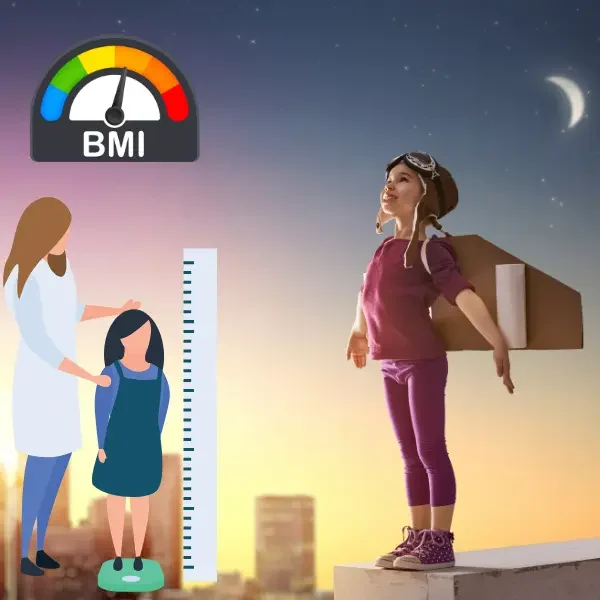What is Children’s BMI Calculator?
A Children’s BMI Calculator is a tool used to calculate a child’s body mass index (BMI), which is a measure of their weight relative to their height. BMI is an important indicator of a child’s overall health and weight status, and can help identify children who may be at risk for health problems associated with being underweight, overweight, or obese.
Using a Children’s BMI Calculator involves entering a child’s age, gender, height, and weight into the calculator, which then calculates their BMI and provides a BMI-for-age percentile based on CDC growth charts. This percentile can be used to determine whether a child’s weight falls within a healthy range for their age and gender.
Children’s BMI Calculators are available here and can be used by parents, healthcare professionals, and educators to assess a child’s weight status, identify potential health risks, and promote healthy lifestyle habits.

What is BMI?
BMI stands for Body Mass Index. It is a measure of body fat based on height and weight. It is calculated by dividing a person’s weight (in kilograms) by the square of their height (in meters). The resulting number is then classified into categories that indicate whether a person is underweight, normal weight, overweight, or obese.
BMI is widely used as a screening tool to identify possible weight-related health problems. However, it is important to note that BMI is not a direct measure of body fat and may not be accurate for individuals who have a high level of muscle mass, such as athletes. It should also be used in conjunction with other health indicators and assessments, such as waist circumference and blood pressure, to get a more comprehensive picture of a person’s overall health status.
What is a normal BMI?
A normal BMI range is typically between 18.5 and 24.9. A BMI below 18.5 is considered underweight, while a BMI between 25 and 29.9 is considered overweight, and a BMI of 30 or above is considered obese.
How do I calculate my BMI?
To calculate your BMI, you can use the following formula:
BMI = weight (kg) / height² (m²)
For example, if you weigh 70 kilograms and are 1.75 meters tall, your BMI would be:
BMI = 70 / (1.75)² = 22.9
What is the correct BMI for my age?
There is no specific BMI range that is considered correct for a particular age. The same BMI ranges apply to adults regardless of age or gender. However, BMI may not be the most accurate measure of health for elderly people, athletes, and some other groups. In those cases, other factors such as muscle mass, bone density, and body composition may also need to be taken into account to get a more accurate picture of health.
What is My BMI?

Children's BMI Calculator:

Your BMI result can provide a general indication of whether your weight falls within a healthy range. Here is a breakdown of BMI results:
- BMI below 18.5: Underweight
- BMI between 18.5 and 24.9: Normal weight
- BMI between 25 and 29.9: Overweight
- BMI of 30 or above: Obese
It’s important to note that BMI is not a perfect measure of health, as it does not take into account factors such as muscle mass or body composition. For example, athletes or bodybuilders may have a high BMI due to their muscle mass, but are still considered healthy.
If your BMI falls outside of the normal range, it may be an indication that you need to make some lifestyle changes to improve your health. For example, if you have a BMI in the overweight or obese range, you may need to focus on losing weight through a combination of healthy eating and exercise.
It’s also important to consult with a healthcare professional to determine the best course of action based on your individual health profile, as BMI is just one indicator of overall health.
Why Children’s Bmi Calculation is Important?
Calculating a child’s BMI is important because it can provide an indication of whether a child is at a healthy weight for their age and height. Children who are overweight or obese are at an increased risk for developing a range of health problems, including type 2 diabetes, high blood pressure, high cholesterol, sleep apnea, joint problems, and mental health issues.
By calculating a child’s BMI, healthcare professionals can identify children who may be at risk for health problems and provide guidance on healthy lifestyle habits, such as healthy eating and physical activity, to promote a healthy weight. Early intervention can also help prevent the development of chronic health problems and improve the child’s overall health and well-being.
Additionally, tracking a child’s BMI over time can provide insight into their growth and development. If a child’s BMI is consistently above the healthy range, it may be an indication that further assessment is needed to identify any underlying health issues or behavioral factors that may be contributing to their weight.
Overall, calculating a child’s BMI is an important tool for promoting healthy growth and development, identifying potential health risks, and preventing the development of chronic health problems.
Children’s BMI is calculated using the same formula as for adults, but the interpretation of the BMI result is different due to variations in growth and development. BMI results for children are compared to age and sex-specific BMI-for-age percentiles to determine whether a child is underweight, normal weight, overweight, or obese.
The Centers for Disease Control and Prevention (CDC) provides BMI-for-age growth charts for children and teens aged 2-20 years old. These charts take into account differences in growth and development among children and provide a more accurate assessment of BMI compared to using adult BMI categories.
Children with a BMI-for-age percentile between the 5th and 85th percentile are considered to have a healthy weight, while children with a BMI-for-age percentile between the 85th and 95th percentile are considered overweight, and children with a BMI-for-age percentile at or above the 95th percentile are considered obese.
It’s important to note that BMI-for-age percentiles are just one indicator of a child’s health and should be used in conjunction with other assessments, such as growth patterns, physical activity level, and dietary habits. If you have concerns about your child’s BMI or overall health, it’s important to consult with a healthcare professional.
BMI CHART:
BMI charts are commonly used to determine whether a person’s weight falls within a healthy range based on their height. Here is a BMI chart for adults:
BMI Chart:
| BMI | Category |
|---|---|
| Below 18.5 | Underweight |
| 18.5-24.9 | Normal weight |
| 25.0-29.9 | Overweight |
| 30.0-34.9 | Obesity class I |
| 35.0-39.9 | Obesity class II |
| 40.0 and above | Obesity class III |
To use the chart, simply find your height on the left-hand side of the chart and then locate your weight on the top of the chart. The point where the two lines intersect will give you your BMI. Based on your BMI, you can determine which category your weight falls into.
It’s important to note that BMI charts are just one tool for assessing weight status and should be used in conjunction with other assessments, such as waist circumference, body composition, and overall health status. It’s also important to consult with a healthcare professional if you have concerns about your weight or overall health.
There are several benefits of knowing your BMI and maintaining a healthy BMI range:
Helps identify potential health risks: High BMI is linked to several health problems, such as type 2 diabetes, high blood pressure, heart disease, stroke, and some types of cancer. Knowing your BMI can help identify potential health risks and motivate you to take steps to improve your health.
Encourages healthy habits: Maintaining a healthy BMI range often requires adopting healthy lifestyle habits, such as eating a nutritious diet, exercising regularly, and getting enough sleep. By monitoring your BMI, you can keep track of your progress and stay motivated to maintain healthy habits.
Improves quality of life: Being overweight or obese can have a negative impact on your quality of life, affecting your mobility, self-esteem, and overall well-being. By maintaining a healthy BMI range, you can reduce the risk of chronic health problems and enjoy a better quality of life.
Helps with weight management: If you are trying to lose weight, monitoring your BMI can help you set realistic weight loss goals and track your progress. By maintaining a healthy BMI range, you can improve your chances of achieving and maintaining a healthy weight.
Overall, knowing your BMI and maintaining a healthy BMI range is an important part of maintaining good health and reducing the risk of chronic health problems.
Why You Should Use a Children’s BMI Calculator to Monitor Your Child’s Health
As a parent or caregiver, it’s important to monitor your child’s health and ensure they are at a healthy weight. One tool that can help with this is a Children’s BMI Calculator. This online tool allows you to calculate your child’s body mass index (BMI) and determine whether their weight falls within a healthy range for their age and gender. Here are eight reasons why you should consider using a Children’s BMI Calculator:
Identify Potential Health Risks: BMI is an important indicator of a child’s overall health and weight status. By monitoring your child’s BMI over time, you can identify potential health risks and take action to prevent health problems associated with being underweight, overweight, or obese.
Promote Healthy Lifestyle Habits: A Children’s BMI Calculator can be a valuable tool for promoting healthy lifestyle habits, such as regular physical activity and healthy eating. By tracking your child’s BMI and working with a healthcare professional, you can develop a plan to promote healthy habits and prevent future health problems.
Monitor Growth and Development: Children’s BMI Calculator provide information on a child’s BMI-for-age percentile, which can be used to track their growth and development over time. This can be especially helpful during periods of rapid growth and development.
Easy to Use: Children’s BMI Calculator are easy to use and can be accessed online from a computer or mobile device. Simply enter your child’s age, gender, height, and weight into the calculator, and it will provide their BMI and a BMI-for-age percentile.
Available for Free: Many Children’s BMI Calculator are available for free online, making them accessible to parents and caregivers on a budget.
Important for Children of All Ages: BMI is an important indicator of health for children of all ages, from infants to teenagers.
Helps Prevent Chronic Health Problems: Monitoring your child’s BMI can help prevent the development of chronic health problems, such as type 2 diabetes, high blood pressure, high cholesterol, sleep apnea, joint problems, and mental health issues.
Helps Ensure Your Child’s Overall Health: By using a Children’s BMI Calculator to monitor your child’s health, you can ensure that they are on the path to a healthy, happy life.
In conclusion, using a Children’s BMI Calculator is an important tool for monitoring your child’s health and ensuring they are at a healthy weight. By tracking their BMI over time, you can identify potential health risks, promote healthy lifestyle habits, and prevent chronic health problems.

